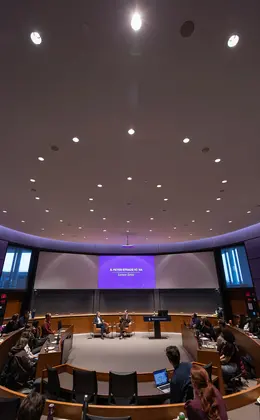
Journalist Mark Hertsgaard Discusses Climate Change and the Media
Hertsgaard, co-founder and executive director of the global media collaboration Covering Climate Now, spoke at the Yale School of Management on April 4 as part of the R. Peter Straus Lecture series.
Covering climate change news accurately and urgently should be a top priority for mainstream media outlets today, journalist Mark Hertsgaard told a Yale School of Management audience on April 4.
“We should be covering climate change like the emergency that science says it is,” said Hertsgaard, co-founder and executive director of the global media collaboration Covering Climate Now and the environment correspondent for The Nation. “It’s an emergency because we have to act very rapidly or it’s going to be too late.”
Hertsgaard spoke at Yale SOM as part of the R. Peter Straus Lecture series. Named for Straus YC ’44, a pioneer in public-service radio, the series presents talks by prominent individuals on topics that relate to the press and public responsibility.
Hertsgaard has covered climate change since 1989, reporting from 25 countries for multiple global media outlets and publishing books on the environmental crisis including Earth Odyssey and HOT.
Stuart DeCew, executive director at the Yale Center for Business and the Environment, introduced Hertsgaard, and Anthony Leiserowitz, director of the Yale Program on Climate Change Communication, moderated the discussion.
Hertsgaard described how he came to devote his career to climate change coverage. His interest in the environment was kindled in childhood.
“I grew up on a farm,” he said. “Nature is part of your life. Very early on it was clear to me the environment was the foundation of all other issues. If you don’t get that one right, nothing else is going to matter.”



While noting that nuclear war and climate change are two issues that currently pose the biggest threats to the environment, Hertsgaard said that climate change is unique in that it is has a “time limit.”
The role of media, he said, is to raise public awareness of the climate crisis and its solutions and to combat disinformation that discredits the human causes of that crisis.
Hertsgaard and some colleagues launched Covering Climate Now five years ago to address the dearth of serious, balanced climate coverage in the mainstream U.S. media. The organization is composed of journalists, not activists; its sole mission is to collaborate in informing the public.
The organization has ballooned in five years and today works with reporters and editors across the U.S. and across the globe. “We have moved the needle, but we have a long way to go,” Hertsgaard said.
Hertsgaard answered a variety of student questions, touching on issues including the erosion of public trust in the media and in the government; the elements that make climate news stories effective; and how policies can assist communities and industries as they transition out of fossil fuel-burning economies.
He encouraged students to push for political change that supports aggressive environmental protection.
“If you care about climate change, vote,” he said, adding that U.S. voter participation is way too low. “Recognize the situation that you’re in and get active.”
